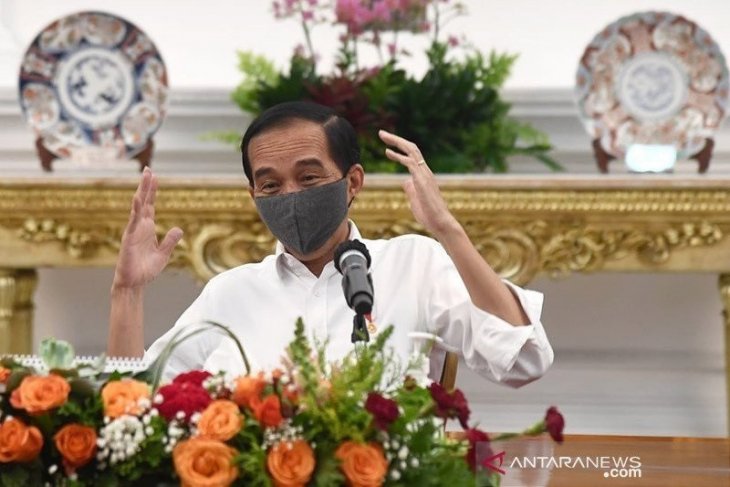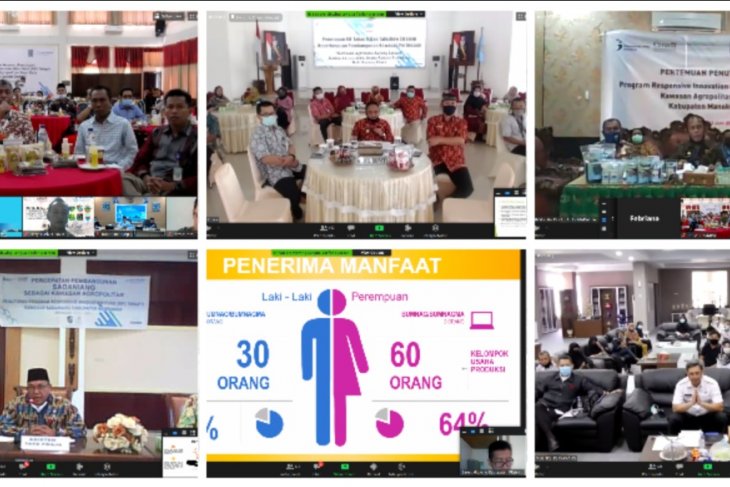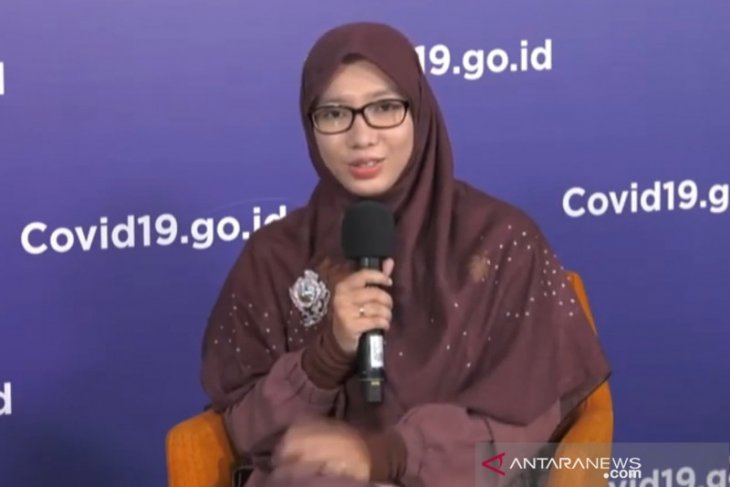Live Streaming
Program Highlight
Company Profile

Ani Hasanah
July

President Joko Widodo during a discussion with journalists at the Merdeka Palace in Jakarta, recently. ANTARA/HO-Ministry of State Secretary Public Relations/pri/sh
State expenditure has become an instrument to leverage the country's economy in the recovery path amid the current crisis arising from the COVID-19 pandemic, according to President Joko Widodo (Jokowi).
At a virtual limited meeting on state budget planning 2021 at the Bogor Presidential Palace, Bogor, West Java, on Tuesday, the president pointed to the state budget having merely contributed some 14.5 percent to the gross domestic product (GDP).
"In such a crisis, the government expenditure has become an instrument to leverage (the economy)," he remarked.
The private sector and micro-, small-, and medium-scale enterprises (MSME) could recover by providing stimulus. "This economic wheel must be leveraged using our on-target state budget," he remarked.
The head of state also highlighted the importance of implementing the country's strategic and main agenda despite the crisis being faced on account of the COVID-19 pandemic.
"This is particularly with the attempt to escape the middle-income trap. Since July 1, Indonesia has become an upper-middle income country. However, we still need to go a long way to escape the middle-income trap," the head of state affirmed.
On July 1, the World Bank classified Indonesia as an upper-middle income country, an upgrade from its earlier status of lower-middle income.
The classifications are based on the gross national income (GNI) per capita. Indonesia witnessed its GNI per capita rise to US$4,050 in 2019, exceeding the income threshold for upper-middle income, from $3,840 in 2018.
Upper-middle income status categorizes countries, with a GNI per capita of $4,046 to $12,535, while the lower-middle income economies are those, with a GNI per capita of between $1,036 and $4,045.
Low-income countries are nations having a GNI per capita of less than $1,036, while those with a GNI per capita of $12,535 are considered high income. (ANTARA)
July

The closing ceremony of Phase II of the RIF program, which was held virtually. (ANTARA / HO-NSLIC)
Indonesia and Canada have completed the second phase of the Responsive Innovation Fund (RIF) program, which aims to strengthen and coordinate national support for the development of innovative local economies.
The innovations involve developing more efficient production processes, new methods for service delivery, sharing resources with other districts to increase efficiency, or using tools and technology to help overcome distances and other obstacles.
The program was implemented through Indonesia’s Ministry of National Development Planning and the National Development Planning Agency and Canada’s Global Affairs Canada (GAC), which is affiliated with cooperation projects of the National Support for Local Investment Climate and the National Support for Enhancing Local and Regional Economic Development (NSLIC/NSELRED).
In a statement issued in Jakarta on Monday, deputy of regional development at the Ministry of National Development Planning/National Development Planning Agency, Rudy Soeprihadi Prawiradinata, said the national development agenda outlined in the 2020-2024 National Medium-Term Development Plan (RPJMN) emphasizes the importance of tangible and measurable policies, programs, and activities to encourage accelerated rural and regional development.
"Local economic development is the main pillar of the performance of the national economy. In line with this goal, local governments are seen as capable of carrying out various economic development innovations if supported by technical support and appropriate instruments," Rudy said.
The NSLIC / NSELRED project provides capacity building support to improve the local investment climate and local economic development at the national level, and is being implemented in 28 selected districts and cities in Indonesia.
Of the 28 districts and cities, 18 have been listed as National Priority Rural Areas (KPPN) under the 2015-2019 and 2020-2024 National Medium-Term Development Plans (RPJMN). The 18 regions have received support through RIF, the grant scheme in the NSLIC / NSELRED Project.
Six regions and innovations were selected for Phase II of the RIF. Manokwari district in West Papua province was selected for the development of organic cocoa and coconut. Dompu district in West Nusa Tenggara province was chosen for a program to increase corn derivative products. Mempawah district in West Kalimantan province was selected for the development of organic black and red rice.
The South Coastal district in West Sumatra was selected for the development of fishery and fruit derivative products to support tourism in the South Coast region of the province; Kayong Utara district in West Kalimantan province for the development of organic corn and coconut; and, Sidenreng Rappang district in South Sulawesi for the development of organic rice to improve food security in the province.
The implementation of the RIF program is expected to be one of several strategic initiatives to support the 2015-2019 and 2020-2024 National Medium-Term Development Plans (RPJMN).
Under Phase II of the RIF program, carried out from April, 2019 to July, 2020, around 700 beneficiaries, including the government, private sector, academia, research institutions, and MSMEs, have received assistance through more than 100 trainings, training sessions, and other types of technical support.
Assistance has also been provided to develop and strengthen local institutions, commodities, or products, and to improve market relations. RIF pilot interventions have opened up employment opportunities for at least 2,929 people, with further opportunities identified for replication and improvement.
Head of cooperation (Indonesia), Global Affairs Canada (GAC), Pierre-Yves Monnard, congratulated the six participating regions for the progress made in terms of increasing productivity, market access, and capacity of local communities, in particular, at least 3,274 women beneficiaries and 142 women's business groups.
"This has helped advance gender equality and promoted the empowerment of women in these areas," Monnard noted.
Monnard also expressed his appreciation for the commitment and support of the national and regional governments towards the implementation of the RIF program’s Phase II.
He noted how the development of the local economy and the improvement of local communities through e-commerce and digitalization has helped them become resilient during the pandemic.
He said he hoped the results achieved and the capacity building can be maintained and expanded further after Phase II of the program. (ANTARA)
President Reminds the Enthusiasm in Handling COVID-19 Should Not Go Down
Jakarta (VOI News) - Indonesian President Joko Widodo in a limited meeting via video teleconference on Monday (7/28) reminded all government officials that the enthusiasm to overcome the crisis due to the COVID-19 pandemic should not go down. That is because, 8 priority provinces such as DKI Jakarta, West Java, Central Java, East Java, South Sulawesi, North Sumatra, Papua and South Kalimantan contributed 74 percent of positive cases of COVID in Indonesia.
"Health policy and economic policy should be balanced. And health care is a priority. You can't loosen up one bit. The aura of the crisis must continue to be echoed. Until later the vaccine is available and can be used effectively," said Jokowi.
President Joko Widodo has asked the Covid-19 Handling and National Economic Recovery Committee to work quickly to resolve the problems on the ground. The President added that the formation of the Covid-19 Handling Committee did not erase the existence of the Covid-19 Task Force at the central and regional levels. The formation of a committee is only to integrate Covid-19's handling in the health and economic sectors that are equally affected. Until Monday, July 27 positive cases in Indonesia reached more than 100 thousand cases. (VOI/ rri.co.id/ Pradipta)
July

Dewi Nur Aisyah, a member of the the COVID-19 Task Force's Expert Team. ANTARA/Katriana
As many as 43 Indonesian districts and cities have not reported a single coronavirus infection and remain free from the pandemic, according to the Task Force on COVID-19 Response.
“So, it turns out that when we examine deeper, there are still 8.4 percent, or around 43, districts and cities in Indonesia that have never registered COVID-19 cases. It's (Their COVID-19 case count) zero,” Dewi Nur Aisyah, a member of the the task force's Expert Team said at a press conference in Jakaarta on Monday.
Data from the task force also shows that 341, or 66.3 percent, districts and cities have recorded less than 100 cases so far.
"This means more than 50 percent of districts and cities in Indonesia (have less than 100 cases),” she noted.
Furthermore, 21 percent, or about 112 districts and cities, have recorded between 101 and 1,000 confirmed cases; and, 3.5 percent, or 18 district and cities, have registered more than 1,000 cases.
"This is what we need to concentrate more on. So there are only 3.5 percent or 18 districts / cities which have a lot of cases. Hence, we see that there is such a wide range from one place to another, and we cannot generalize," she remarked.
Meanwhile, speaking about the number of deaths per 100,000 population, she noted that 238 districts and cities, or around 46 percent, have reported no casualties due to COVID-19.
"So, it's almost half, 46 percent," she stated.
Meanwhile, 78 districts and cities have recorded just one death related to COVID-19, and 26.65 percent have seen a mortality rate of between 2 and 10.
She added that 11.88 percent of the districts and cities have recorded fatalities.
Surabaya, the capital of East Java province, has so far registered 803 deaths, the highest in the country.
The task force is mapping regional risk zones as there is a very wide variation in COVID-case numbers reported across the country's district and cities. (ANTARA)


